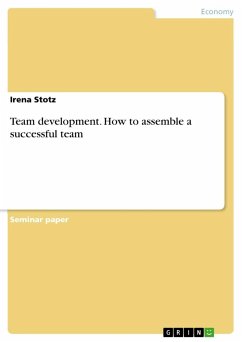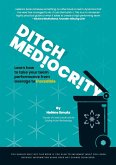Seminar paper from the year 2012 in the subject Business economics - Miscellaneous, grade: 1,3, University of applied sciences Dortmund, language: English, abstract: Teamwork is the most important factor in achieving success in competition for companies. Teamwork should support companies to operate effectively and flexibly in the market. For employee's teamwork is also important; in every job advertisement teamwork is required. And the higher an employee rises on the career ladder, the more important teamwork becomes. Previously, employees often work in departments, these days in many companies the employees work in project or task orientated teams. The task of today's managers is to build a cohesive and successful team out of a group of individuals. This team has to work together for a specific time and afterwards they will have to work developing new projects. This assignment highlights successful teams and how they can be assembled and work together. This will be demonstrated in the second chapter using Belbin's team role inventory. To begin with, the different team roles will be described and afterwards the differences between unsuccessful and winning teams will be discussed. After a successful team is assembled, they are paced through the stages of team development. The most famous model of team development is the five stages by Bruce W. Tuckman, which will be analyzed in the third chapter. Later, the phases of team development will be shown. The limits of this model will also be illustrated. The fourth chapter summarizes the development of this work.
Hinweis: Dieser Artikel kann nur an eine deutsche Lieferadresse ausgeliefert werden.
Hinweis: Dieser Artikel kann nur an eine deutsche Lieferadresse ausgeliefert werden.








